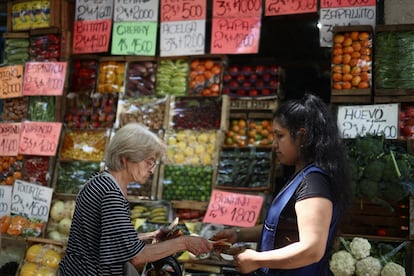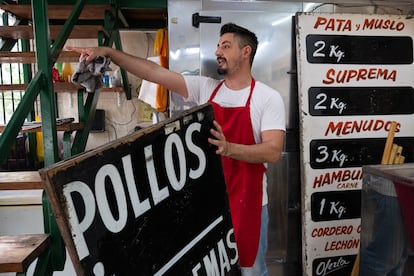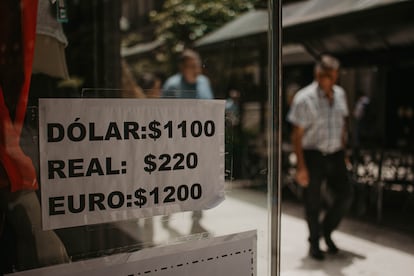Prices soar in Argentina after Milei’s currency devaluation
Unions are meeting to discuss their response to an adjustment plan whose burden, they warn, will fall on the working class: ‘A total social tsunami is coming’

Argentina’s new self-declared “anarcho-capitalist” president, Javier Milei, has begun his open heart surgery of the economy and the country now awaits the consequences. The most visible effects, 24 hours after he announced measures that included a peso devaluation of 50% against the dollar, are a rapid rise in prices of up to 100%, and a calm reaction from the markets. There is a consensus among economists that the situation is critical and requires a fiscal adjustment, although they are divided on the measures required to carry it out. The unions and social movements, on the other hand, are warning that the new government’s course of action will mean financial ruin for Argentines and they have called emergency meetings to debate appropriate responses.
“We have found a patient in intensive care about to die. We are not willing to let him die,” the presidential spokesman, Manuel Adorni, said on Wednesday at the new administration’s daily news conference. This was the argument used to justify a package of measures described as “necessary and inevitable,” and about which the government has not yet offered all the details. “We need [international] credibility and you can’t get it by spending more than you have. It is not negotiable,” Adorni concluded, adding that the package announced earlier this week is only the beginning of more measures that will be announced in the coming weeks and will be, he said, “really profound.”
“The immediate consequence of the measures is, without a doubt, a strong increase in inflation,” warns the economist Juan Manuel Telechea. Inflation in November was 12.8%, but that figure is already falling short of reality. Between Monday and Wednesday, the price of meat increased by more than 40% while the price of international plane tickets doubled. Speculation is rampant and there are still businesses that are not selling goods and services because they are updating their prices, while others warn that today’s quote may not be valid for tomorrow.

A new option that has gained traction in recent months is covert dollarization. The best-known case is that of apartment rentals: there is very little supply, and owners often attempt to negotiate prices in dollars outside the law. This system is now extending into new fields as the value of the peso collapses. A tooth extraction not covered by basic health insurance costs around $400. Customers can pay in U.S. currency or, alternatively, in pesos at the parallel exchange rate of the day. On Wednesday that rate was 1,070 pesos to the dollar, fully 30% higher than the official exchange rate.
In the emergency package announced by Economy Minister Luis Caputo, the strongest blow was the official devaluation of the peso by 51%: from 400 pesos to the dollar to 820 pesos. There were also announcements aimed at cutting public spending with which the government hopes to save the equivalent of almost three points of GDP: a freeze on public works, an increase in retirements ordered by decree, a reduction of subsidies for transportation and energy, fewer federal fund transfers to the provinces, and the cancellation of official advertising, among other measures.

Although Milei promised during his campaign that he would not raise taxes, he has backed down. Imports will pay a tax of 17.5%, there will be new levies on exports and the change in income tax promoted by the previous Peronist government for electoral purposes will be revoked. With these measures, Milei is confident that state revenues will increase by 2.2 points, which, added to the planned spending cuts, would round out the 5% of GDP adjustment plan.
The economist Telechea believes that in the coming months inflation will be between 30% and 40% monthly, given the magnitude of the devaluation. If this is the case, he warns, the increases in social aid announced for the most vulnerable sectors will be “highly insufficient” both in terms of the amount and the difficulty reaching those who work in the informal economy. In Argentina, 40.1% of the population is poor and 9.3% is destitute, meaning that their income is not enough to buy food.
“The mega-devaluation that is being carried out is a matter of concern because it may devolve into hyperinflation,” says the economist Pato Laterra, who teaches at the National University of La Plata. He also believes that the lack of price control measures in Milei’s plan will aggravate this scenario: “In recent weeks, since the presidential election runoff, prices have risen 50% and they will continue to rise. ”
Stable markets
The International Monetary Fund (IMF) applauded the measures, which also seemed to please the markets. The price of the dollar on the parallel retail market remained stable. The Central Bank of the Argentine Republic maintained interest rates at 133%.
Emiliano Libman, researcher at the National Scientific and Technical Research Council (Conicet) and Fundar, believes that it will be important to see “the political and social sustainability” of the plan. “We must keep in mind that things are not going to turn out as they look on paper,” he warns. “This is the first round of the package: prices are going to rise, you are going to have more inflation in December, in January, in February... And then there will be a response from those who lost income, the workers and the social movements. It is a mystery to me how that dynamic is going to unfold.”

Milei assured that the bulk of the cuts was going to be paid for by the “political caste,” but the measures show that this will not be the case. “It is nonsense to say that the adjustment will be made by caste. It’s symbolic,” says Libman. “Obviously, it is not [in the adjustment plan]. It’s impossible because the numbers don’t add up. You cannot solve Argentina’s fiscal problem like this. It is good that there is a symbolic cut, but it does not move the needle very much.” According to this economist, Argentina was in such a delicate situation that it was very difficult to imagine a horizon for the next few months in which there would not be some drop in income, but he is still optimistic about the fact that Milei’s measures are much more realistic than those he promised during the campaign, such as dollarizing the economy and shutting down the central bank.
The opposition is now awaiting the details of the economic measures and the large package of legislative reforms promised by the government before issuing a public opinion. Until now, the most critical voice has been that of unions and social movements. The main labor union in Argentina, the General Confederation of Labor (CGT), called an emergency meeting on Wednesday to analyze the measures and how to respond to a painful adjustment plan that will fall on the backs of the working class. “A total social tsunami is coming,” warned the secretary of the construction union, Gerardo Martínez. This sector will be one of the most affected by the stoppage of public works, on which nearly 400,000 people depend.
Trade unionist Hugo Godoy accused Minister Caputo of “exaggerating the inherited crisis situation to justify inadmissible measures, which will increase poverty levels in Argentina above 50% in a matter of days.” Godoy considered that the announced measures will have a strong impact on small and medium-sized businesses and will represent “an industricide, with the consequent loss of jobs.”
The shock therapy implemented by Milei reminds Argentines of other previous shock therapies, such as the one introduced by the neoliberal president Carlos Menem in the 1990s. Then, as now, the Argentine economy was in a critical situation. The only certainty that everyone shares is that the surgery will be long and painful.
Sign up for our weekly newsletter to get more English-language news coverage from EL PAÍS USA Edition
Tu suscripción se está usando en otro dispositivo
¿Quieres añadir otro usuario a tu suscripción?
Si continúas leyendo en este dispositivo, no se podrá leer en el otro.
FlechaTu suscripción se está usando en otro dispositivo y solo puedes acceder a EL PAÍS desde un dispositivo a la vez.
Si quieres compartir tu cuenta, cambia tu suscripción a la modalidad Premium, así podrás añadir otro usuario. Cada uno accederá con su propia cuenta de email, lo que os permitirá personalizar vuestra experiencia en EL PAÍS.
¿Tienes una suscripción de empresa? Accede aquí para contratar más cuentas.
En el caso de no saber quién está usando tu cuenta, te recomendamos cambiar tu contraseña aquí.
Si decides continuar compartiendo tu cuenta, este mensaje se mostrará en tu dispositivo y en el de la otra persona que está usando tu cuenta de forma indefinida, afectando a tu experiencia de lectura. Puedes consultar aquí los términos y condiciones de la suscripción digital.








































